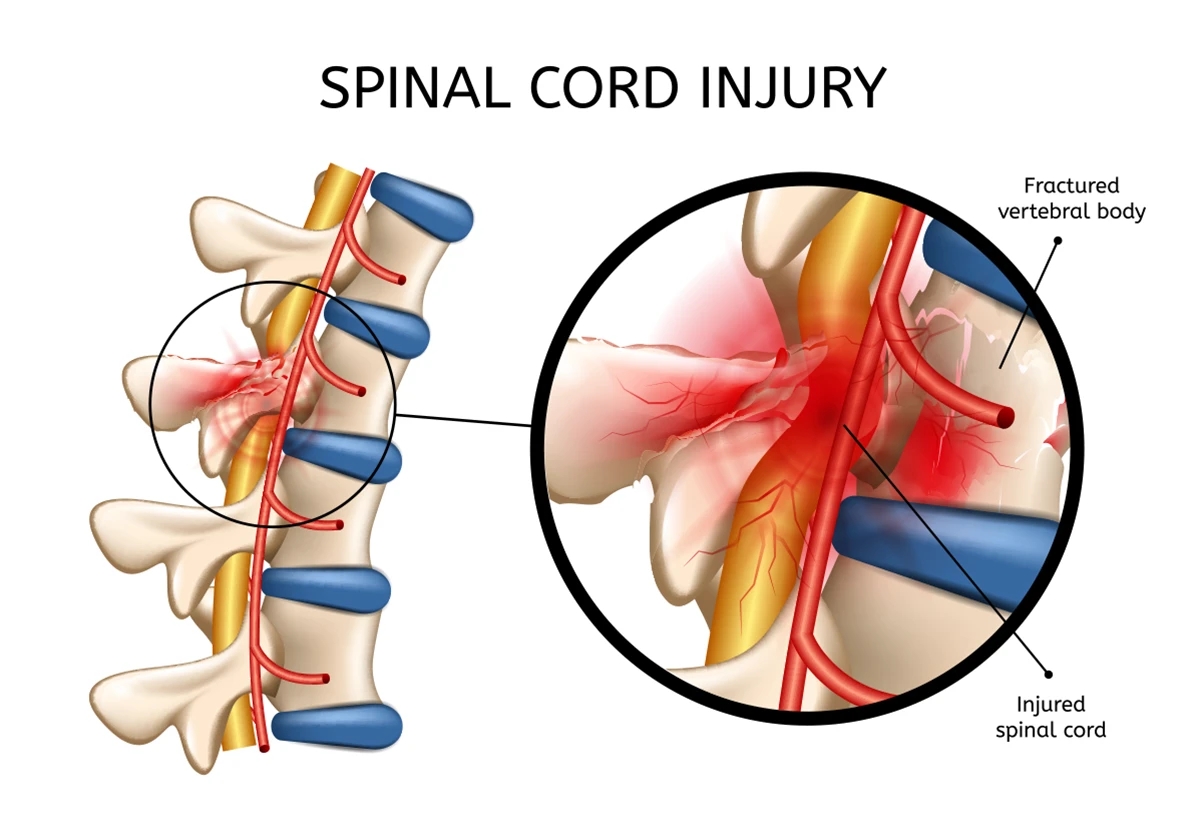Acute spinal cord injury
Find a spine specialistA spinal cord injury can occur unexpectedly. Whether it’s a sudden impact from a car accident or a sports injury, or even underlying conditions like osteoporosis, cancer, multiple sclerosis or arthritis, you can trust Advocate Health Care’s Spine Care Center to get your back on your feet.
Our team of spine specialists stands by your side with expert care for acute spinal cord injuries. We use the most advanced diagnostic tools and innovative treatment methods to help you recover from a spinal cord injury.
What is an acute spinal cord injury?

An acute spinal cord injury is a potentially life-changing injury that occurs when the spinal cord is damaged, bruised, compressed or severed.
The spinal cord is a bundle of nerves that runs from the brain down the back, carrying messages between the brain and the rest of the body. When the spinal cord is injured, these messages can be interrupted, leading to a loss of function below the level of the injury, such as the ability to use your legs.
Types of acute spinal cord injuries
The severity of an acute spinal cord injury (SCI) depends on the extent of the damage to the spinal cord. There are two types of acute spinal cord injury:
- Incomplete: An incomplete SCI is an injury that does not completely sever the spinal cord.
- Complete: A complete acute spinal cord injury is one that severs the spinal cord completely, resulting in a loss of all feeling and movement below the level of the injury (paralysis).
Symptoms of spinal cord injury
A spinal cord injury is always a serious concern. It can affect your daily life and ability to perform basic functions, such as doing your job or getting dressed.
Symptoms can be severe, moderate or mild depending on the severity of your spinal cord injury and where it’s located on your spinal cord.
Common symptoms include:
- Loss of bladder and bowel control: This can lead to incontinence or difficulty emptying the bladder or bowels.
- Loss of movement: This may include paralysis, weakness or muscle spasms or stiffness.
- Loss of sensation: This may include numbness, tingling or burning pain below the level of the injury.
- Pain: This can be caused by the injury itself or by other complications, such as nerve damage.
- Sexual dysfunction: This can include problems with erectile dysfunction, achieving an orgasm or fertility.
There are times where a spinal cord injury may be life-threatening. Call 911 or go to your nearest emergency department if you’re experiencing any of the symptoms below:
- Lack of alertness (semi-consciousness or unconsciousness)
- Difficulty balancing or walking
- Shock (pale skin, bluish lips and fingernails)
- Oddly positioned or twisted neck or back
- Difficulty breathing
Is your back and neck pain cause for concern?
Back and neck pain can interrupt even the simplest things in life and can point to a serious problem. Our back and neck pain quiz evaluates your spine function, pain symptoms and risk factors and gives you an idea of what to do next based on your results.
Diagnosis of spinal cord injuries
Diagnosing a spinal cord injury involves a combination of a physical exam and imaging tests to pinpoint the location and extent of the injury.
During your physical exam, your provider will review your medical history and ask about how the injury happened, any pre-existing conditions and if you’ve had any past injuries.
To diagnose your injury, your doctor will use a standardized neurological exam, which includes testing your motor and sensory skills, as well as an anal muscle test to determine whether the injury has affected the base of your spine.
Your provider may also order digital imaging tests, such as:
- MRI or CT scan: These tests allow your doctor to assess nerve and spinal column damage, blood clots or masses.
- X-rays: This test can reveal vertebral (spinal) fractures, tumors or degeneration.
Accurate and timely diagnosis is crucial for getting the proper treatment and optimizing recovery. Schedule an appointment with your doctor right away if you suspect a spinal cord injury.
Treatment options for spinal cord injuries
Treatment depends on the severity of your injury. Doctors will first work to stabilize your breathing and immobilize your neck to prevent further damage. After that, you may be admitted to a trauma center with specialized care for spinal cord injuries. Specialized care may include:
- Surgery: In some cases, your doctor may need to remove fragments of bone or fractured vertebrae.
- Rehabilitation: Physical therapy and occupational therapy work to strengthen your muscles and help you relearn skills or techniques so you can become more independent. Therapy may begin while you’re in the hospital. It can continue as you transition to a rehabilitation center or an outpatient facility.
- Medication: Corticosteroid drugs can reduce swelling.
- Immobilization: Traction, braces, harnesses and collars can stabilize your spine and stop you from moving.
Find spine care near you
When you have a spinal cord injury, the Advocate Brain & Spine Institute makes it easier for you to get back to the things that matter most.
Our spine specialists are committed to providing you with easy access to outstanding care. We offer convenient locations throughout the Chicagoland area.
Get care
We help you live well. And we’re here for you in person and online.